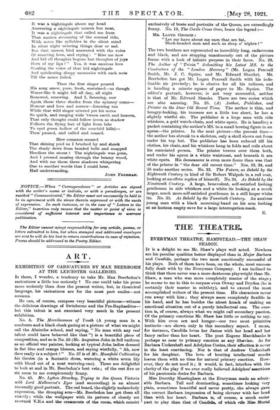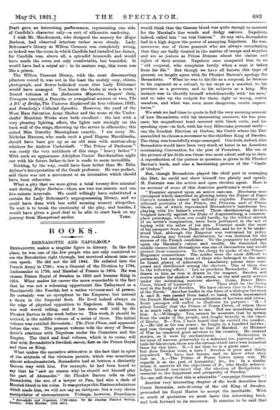THE TIEFATRE.
EVERYMAN THEATRE, HAMPSTEAD.-1.111: SHAW SEASON.
IT is a delight to see Mr. Shaw's plays well acted. Nowhere are his peculiar qualities better displayed than in Major Barbara and Candida, perhaps the two most emotionally successful of his plays. Both of them have been, on the whole, most success- fully dealt with by the Everyman Company. I am inclined to think that there never was a more dexterous playwright than Mr. Shaw, a man who was more completely master of the stage ; he seems to me in this to surpass even Otway and Dryden (he is certainly their master in subtlety), and to exceed the most accomplished writers of the present time. His characters never run away with him ; they always seem completely flexible in his hand, and he has besides the nicest knack of making an emotional situation out of a purely intellectual one. The emo- tion is, of course, always what we might call secondary passion. Of the primary emotions Mr. Shaw has little or nothing to say. With him even sex and hunger—our two most primitive instincts—are shown only in this secondary aspect. I mean, for instance, Candida loves her James with her head and her fancy rather than her heart. The poet Eugene Marchbanks is perhaps as near to primary emotion as any Shavian. As for Barbara Undershaft and Adolphus Cusins, their affection is never in the least convincing. Nor is that of Andrew Unclershaft for his daughter. The love of hunting intellectual marks leaves them with no time far natural primary emotion. How- ever, they do not need it ; it would, in fact, interfere with the clarity of the play if we ever really believed Adolphus' assertions
of his passionate desire for Barbara. -
Miss Dorothy Massingham at the Everyman made an admir- able Barbara. Tall and dominating, sometimes looking very plain, sometimes beautiful and never pretty, she always gave the correct Barbara impression of being cleverer with her head than with her heart. Barbara is, of course, a much easier Part to play than that of Candida, of which rdie Miss Muriel
Pratt gave an interesting performanoe, representing, one, side of Candicta's character only—a sort. of silhouette rendering.
I wish Mr.. Macdermott, who designed the scenery for Mader Barbara, had observed' interiors rather more closely. Lady. Britomart's library at Wilton Crescent was completely wrong, so indeed was the-room in which .Candidahadinstalled her James, for Candida was, above all; a splendid housewife and. would have made the room, not onlY comfortable, but beautiful. It would have had a sok* air : in its. austere way, this room was like. a prison.
The Wilton Crescent library, with the most disconcerting pilasters round' it, was not in the least the unduly. cosy, chintz, photograph, and flower-bedecked' room that Lady Britornart would, have arranged. You know the books in such a room Bound volumes of the Badminton Magazine,. Rogers' /ta/y, Tennyson (tmcut),,a Puseyite or evangelical sermon or two, The A BC of Bridge, The Universe Explained. (in four volumes, 1832), and Somebody's Collected Speeches. However, the yard. of the West Ham Salvation Army Shelter and' the scene at the Under, shafts' Munition Works were both excellent : the last with a very pleasing lighting effect, the lights cast strongly on the back- wall of the stage, throwing up the actors in silhouette; this. suited Miss Dorothy Massinghant exactly. I am sorry Mr.. Nicholas Hannen, who made such a good Eugene Marchbanks,. should have been got up as an old man with mutton-chop whiskers for Andrew Undershaft. " The Prince of Darkness "- was surely the very antithesis of this stage "heavy father" 1" With such an appearance Adolphus Civeins! Bacchanalian night out with his fixture father-in-law is made to seem. incredible.
Nothing, by the way, could have been better than Mr. Felix Aylmer's interpretation of the Greek professor. He was perfect, and' there was not a movement or an intonation which should have been otherwise.
What a pity that we were. given a total twenty-five minutes! wait during Major Barbara—there are two ten-minute and one five-minute intervals. We could willingly have substituted a curtain for Lady Britomart's unprepossessing library, and we could have done with less solid seeming scenery altogether. To wait is to break the continuity of the play, and besides, I would have given a good deaf to be able to start back on my journey. from Hampstead earlier; TARN.



































 Previous page
Previous page